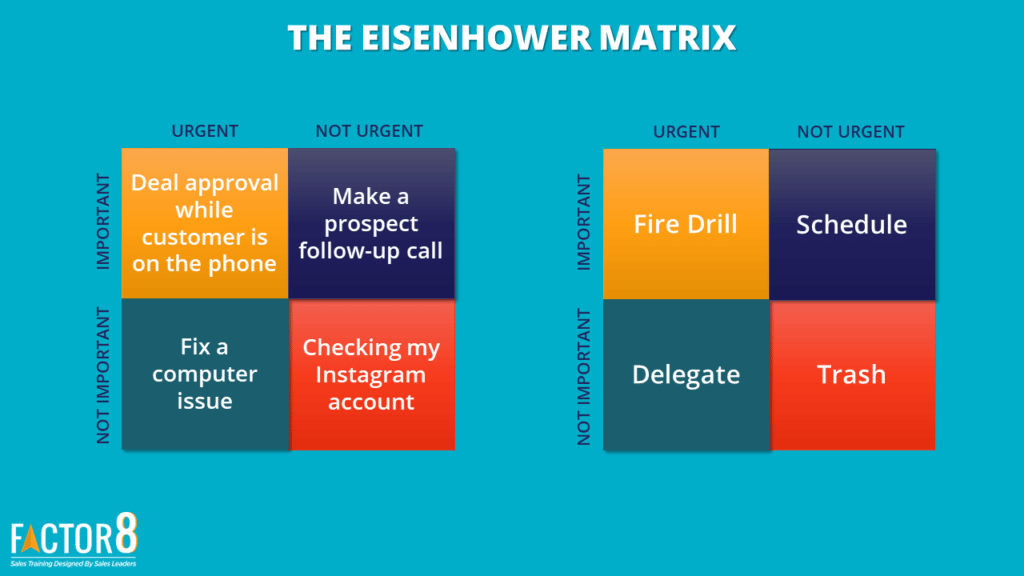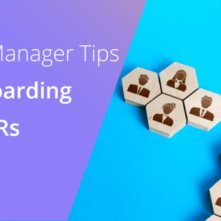Top 8 Sales Management Productivity Hacks
Fact: Sales management is the busiest job in the world. Okay, maybe that’s not a real fact, but if you’re a sales manager, you probably feel like it is. Chances are, you’ve got a pretty tremendous and stressful workload. According to the American Institute of Stress, 39% of stress reported amongst employees in the US is caused by an overwhelming amount of work.
So, what happens when you can’t get it all done? For starters: you go home later, you feel less satisfied with your accomplishments, and you add an extra level of anxiety to your plate. Let’s get some of that time back in your day.
Here are our top 8 sales management productivity tips:
1. Make Proactivity the Goal
Start by leaving your reactive self in the past. How? First, we need to identify your priorities. I get it, you received 100 emails just in the time you are reading this blog. But you were not hired to write emails. So, let’s take a closer look at what you were hired to do and what your priority should be. Next, set your daily goal to hit that priority. Setting (and hitting) that goal will make you feel a lot more productive and will make it easier for you to stay on track. Finally, we need to learn how to recognize whether the new things that come our way each day are proactive versus reactive. This will help you say “no” at the right times and help you prioritize the things that you really NEED to get accomplished.
Hint: Reading emails = Reactive. Helping reps with questions that pop up = Reactive. Calling a strategy meeting to help a rep hit their goal = Proactive! Creating a new KPI report = Proactive!
2. Rethink Meetings
Your meeting cadence is the process that organizes your team’s regular interactions. When scheduled properly, the cadence will prevent you from handling a series of reactive “fires” every day. Create the cadence that works best for you and your team. We’ve taken a bit of time to dive into the 8 essential sales manager meetings. Check out this deep dive and learn which meetings are short, which are long, which are 1:1, and which should be done in a group. Read more here: 8 Essential Manager Meetings. While you’re working on your meeting cadence you can also perfect your 1:1 meetings.

3. Live in the Matrix
Have you used the Eisenhower Matrix before? If not, it all starts by asking yourself 2 critical questions. Is it urgent? Is it important? From there we break things down into 4 groups.
- Is this a Fire Drill?
- An item to Schedule?
- An item to Delegate?
- Or an item to Trash?

Let’s dive in a little deeper to see how these questions help us categorize each task. First are the urgent items. Urgent means time-sensitive and goal-related. Maybe the customer is on the phone and needs an answer to close the deal, or maybe the contract department is reviewing your deal in 1 hour and you need to tie up a few loose ends first.
Next are the important items. Important means it is critical to the mission but it is not time-sensitive. These important things can be scheduled out. This might be mapping out a strategy for a certain campaign, or reviewing the team\’s numbers to ensure they will hit goal.
Now, let’s see how the two questions help us categorize our tasks
- Important + Urgent = Fire Drill – do it ASAP
- Important + Not Urgent = Schedule – put some time on your calendar to complete the task
- Not Important + Urgent = Delegate – find the right member of your team to handle this task
- Not Important + Not Urgent = Trash – remove it from your plate
4. Start Saying “No.” A LOT
Spoiler alert: You’re about to find out that 3 out of 4 requests aren’t urgent OR important. Oftentimes, they’re actually something your rep can figure out on their own. So, we need to get REALLY good at pushing pop-up requests to meetings, delegating to others, and taking them off your plate!
Here’s how we’ll do it:
- Identify the proactive tasks
- Categorize tasks according to urgency and importance
- Properly respond to requests. It looks something like this…
“Hey, (Rep) this sounds AWESOME! But I’m late on a deadline right now, could you bring the story and the call recording to our call coaching session next week?”
OR
“Whoa, (Rep), I need to stop you a moment. This sounds important and I want to give it the time it deserves. Please put it on the agenda for our 1:1 next week?”
If you’re on Slack, it could sound like this…
- Manager: What’s up?
- Rep: Got a minute?
- Manager: I have 30 seconds right now, or 15 minutes at 2pm. Hit me back then if you still need help?
- Here we are putting the action item back on them. You’re not saying you will call them at 2pm, you’re saying call me if you can’t figure out a solution to your problem.
OR
- Rep: Got a minute?
- Manager: Sorry, in a meeting. Can you reach out to Bob, please?
- Here we are delegating to someone else to help the rep.
5. Get COACHN℠
I probably spent 3 hours preparing for my first team meeting. From the scheduling, to figuring out what to say, to deciding what I needed, to realizing I forgot really important things, it was draining, to say the least. What I realized is that if I streamlined the process and prepared for each meeting the same way, I could save myself HOURS of previously wasted time (I only say wasted because those hours were not helping my team reach goal).
Through that painful process, we developed the COACHN Model™. This acronym is about to make your meeting preparation SO MUCH EASIER!
COACHN℠ stands for:
C: Clarify Expectations – This sets the tone for the meeting. “Last time you decided to work on your intros and I know we have a few calls scored. Let’s see how you’re improving.”
O: Observed Behavior – You start first, lay out facts, and list your observations before you…
A: Ask Questions – Great leaders talk in questions. Have them prepared before your meeting.
C: Commit to Actions – Your number of action items should be 0-1, their action items can be anywhere from 1-4
H: How Can I Help – This helps the rep learn to trust you. Growth is good, but we cannot grow unless we can admit that we need help!
N: Next Steps – We are agreeing at the end. “You own this, I own that, we’re going to meet again ______. Will you (rep) please send the invite!”
6. Have One Source of Truth Within the Organization
Use a standard coaching form. Define what “good” is across the company. If people move or shift, you don’t need to retrain or redefine these elements. If you need a place to start, you can grab our Call Coaching Activities here to help you prioritize and plan your coaching sessions.
7. Stop Proving, Start Delegating
It’s time to put your reps in charge. I get it, you want to help them. But you need to stop giving the fish away. Stop solving all of the problems and owning all of the actions. It’s time to teach those reps to fish instead!
Here are 6 easy things you can delegate TODAY:
- Grading their own call recordings and creating a list of skills to improve
- Sales huddles – Not all of them, but maybe 1 per week
- Notes from all meetings (actions, decisions, and deliverables)
- Their PIP actions and check-ins
- Scheduling follow-up meetings
- Team meeting training
- This one will require a bit more guidance, but instead of running every training session, let\’s open up a few for peer training. You will need to double-check their work beforehand (no one wants a 2-hour “look at me” session). But if you have a top rep that is CRUSHING prospecting or brush-offs, let them show the rest of the team how they do it.
8. You Cannot Control How Much Other People Care
This was a tough one for me to really wrap my head around in the beginning. But the truth is that there is a reason that you were promoted to manager. There is a reason that other people will remain as a rep. You cannot control how much other people care. When you care more about their job than they do, it will cause numerous problems.
Let me tell you a little story. Back at the beginning of my sales career, I had a rep, let’s call him “George.” Well, George just could not seem to get himself to work on time. I got one excuse after another. There was a part of me that felt guilty that I didn’t have car trouble and that I could afford a new alarm clock, etc. One Thursday during lunch I left work to go across the street to buy George a new alarm clock (I know, I know). That was when it hit me. What the hell was I doing? If George didn’t care enough to figure out how to get an alarm clock on his phone or borrow a buddy’s clock, or heck, go to Goodwill and buy a used one, then why did I care so much? That was my “ah-ha” moment. I was caring more than George and no amount of new alarm clocks was going to force him to care more.
You need to stay within your span of control. You can control your schedule, your reactions to things, and your time. You don’t control your team, you can’t control a pricing increase, you don’t control what the customer’s going to say, you just don’t. You can influence your team’s skill level, activity, and focus, but you can’t control it. There are a lot of things under your concern, but that you can’t control. There is very little you can actually control. So, stop spinning your wheels and stressing out about it. You can provide coaching and help when appropriate, but “George” is either going to make it or he’s not.
BONUS!
- Kill all of your notifications! All of those Instagram posts and text messages can wait until your lunch break. These notifications will only distract you and make completing your tasks take much longer.
- Time block goal actions on your calendar. Block out checking your email, your phone messages, etc.
- Keep tasks in the same place. Your meetings and your time-blocked tasks are on your calendar. But I’m betting you also have a bunch of other things to do. Compile all of those to-dos into one list. Whether it’s an app or a paper list, keep everything in the same place so nothing slips through the cracks.
- Set a time for similar actions and tasks. If you have 3 tasks on your to-do list that require emails, complete those tasks during your time block to check emails. If you need to go pick something up, do it at the same time you need to go to the post office. By grouping similar tasks together, your mind will be able to focus more efficiently and complete those tasks faster.
I know this was A LOT of information and your inbox has probably increased by 200 emails now, but if you take the time to start implementing at least some of these sales management productivity hacks that we talked about here, it will make a difference: in both your success and your happiness! You will feel and be more productive. It will just take a little practice!





